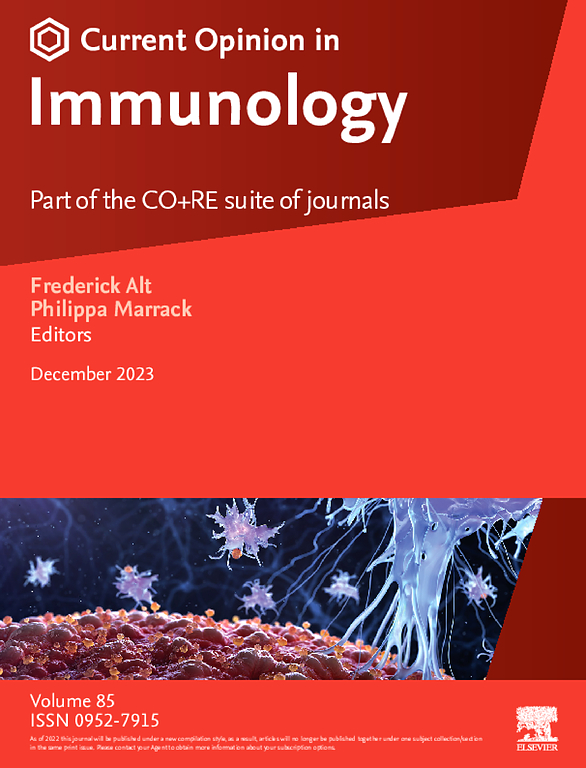Autoimmune-related adverse events induced by immune checkpoint inhibitors
IF 5.8
2区 医学
Q1 IMMUNOLOGY
引用次数: 0
Abstract
Targeted immunotherapies, particularly immune checkpoint inhibitors (ICIs), have transformed cancer treatment by significantly improving patient response and survival rates. However, ICIs could disrupt self-tolerance, inducing the development of immune-related adverse events (irAEs). Most irAEs are classified as autoimmune conditions mediated by ICI-activated CD8+ cytotoxic T cells or activated B cells producing pathogenic autoantibodies. These irAEs phenotypically resemble spontaneous autoimmune disease and lead to considerable morbidity, health care costs, and compromised treatment efficacy. With the widespread use and new emergence of ICIs, the spectrum of ICI-induced irAEs has become increasingly extensive and complex. Concurrently, research in this field is advancing rapidly, a review summarizing the latest progress on irAEs is timely and essential. In this review, we highlight numerous recent research advances, covering the epidemiology, immune mechanisms, and diverse manifestations of irAEs, with a particular focus on organ-specific autoimmunity. We also discuss current strategies, challenges, and future directions for the prevention and therapeutic management of these adverse events.
免疫检查点抑制剂诱导的自身免疫相关不良事件
靶向免疫疗法,特别是免疫检查点抑制剂(ICIs),通过显著提高患者的反应和生存率,已经改变了癌症治疗。然而,ICIs可能会破坏自我耐受性,诱发免疫相关不良事件(irAEs)的发生。大多数irae被归类为由ici激活的CD8+细胞毒性T细胞或激活的产生致病性自身抗体的B细胞介导的自身免疫性疾病。这些irae在表型上类似于自发性自身免疫性疾病,并导致相当高的发病率、医疗费用和治疗效果受损。随着ici的广泛应用和新出现,ici诱导的irae的谱变得越来越广泛和复杂。与此同时,该领域的研究也在迅速发展,总结其最新进展是及时而必要的。在这篇综述中,我们重点介绍了许多最近的研究进展,包括流行病学、免疫机制和irAEs的多种表现,特别关注器官特异性自身免疫。我们还讨论了这些不良事件的预防和治疗管理的当前策略、挑战和未来方向。
本文章由计算机程序翻译,如有差异,请以英文原文为准。
求助全文
约1分钟内获得全文
求助全文
来源期刊
CiteScore
13.30
自引率
1.40%
发文量
94
审稿时长
67 days
期刊介绍:
Current Opinion in Immunology aims to stimulate scientifically grounded, interdisciplinary, multi-scale debate and exchange of ideas. It contains polished, concise and timely reviews and opinions, with particular emphasis on those articles published in the past two years. In addition to describing recent trends, the authors are encouraged to give their subjective opinion of the topics discussed.
In Current Opinion in Immunology we help the reader by providing in a systematic manner: 1. The views of experts on current advances in their field in a clear and readable form. 2. Evaluations of the most interesting papers, annotated by experts, from the great wealth of original publications.
Current Opinion in Immunology will serve as an invaluable source of information for researchers, lecturers, teachers, professionals, policy makers and students.
Current Opinion in Immunology builds on Elsevier''s reputation for excellence in scientific publishing and long-standing commitment to communicating reproducible biomedical research targeted at improving human health. It is a companion to the new Gold Open Access journal Current Research in Immunology and is part of the Current Opinion and Research(CO+RE) suite of journals. All CO+RE journals leverage the Current Opinion legacy-of editorial excellence, high-impact, and global reach-to ensure they are a widely read resource that is integral to scientists'' workflow.

 求助内容:
求助内容: 应助结果提醒方式:
应助结果提醒方式:


